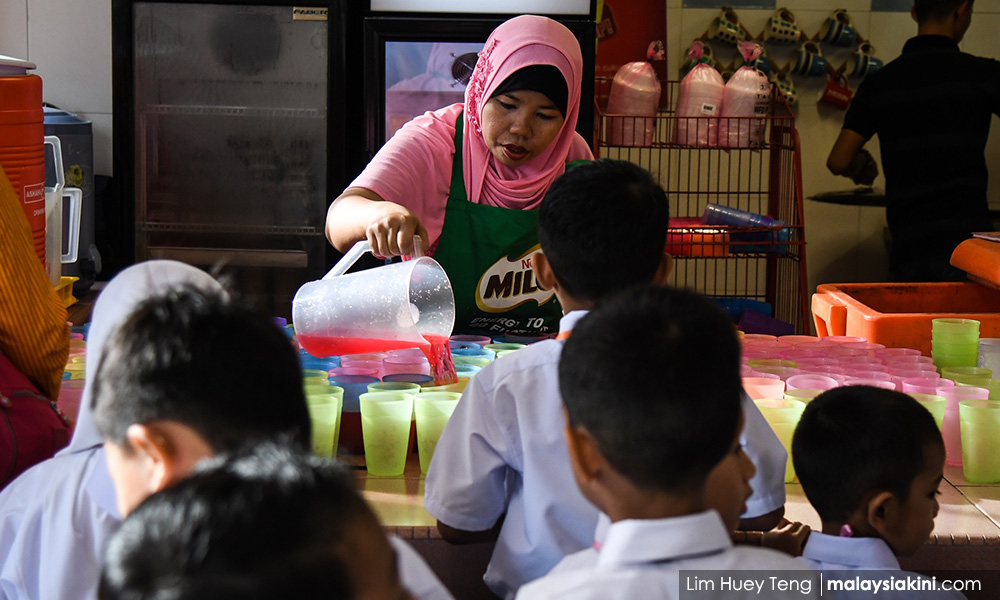LETTER | Malaysians have reacted in varying ways to the recent directive from Education Minister Fadhlina Sidek for school canteens to stay open during Ramadan.
Unfortunately, a portion of Malaysians have tried to turn this directive into a new game of racial, cultural and religious sensitivity, more than it should have been.
For example, as reported by news outlets, the opposition has proceeded to admonish the minister for her “rash” and “overboard” actions. They believe that the idea of opening school canteens goes against societal norms, allows the “disrespecting” of Ramadan, as well as potentially opening the floodgates to other threats to religious sensitivity.
Some canteen operators too have taken to social media like Facebook to voice out their concerns and lament the decision, as they claimed to receive only a meagre return for their operations during Ramadan in schools.
Nevertheless, Malaysians have taken it upon themselves to counter-argue the narratives. For instance, some people chided the opposition by sarcastically remarking that the nation should close canteens everywhere, and not just in schools if it is all about teaching respect.
Netizens have provided their guidelines in ensuring operators don’t sustain losses while operating during Ramadan, including by utilising the pre-order method to gauge the required amount of sundries needed.
Nurturing our youth
The above examples show how much Malaysians have reacted to small, yet impactful, policies, both positively and negatively. From the eyes of an educator though, the opening of school canteens during Ramadan may as well work as a play towards humanising education.
In October last year, Fadhlina introduced the notion of “Pendidikan Manusiawi”, loosely translated into “Humanising Education”, with the goal of training and nurturing our youth to be adaptable, morally strong and bright contributors to developing Malaysia.

This notion aligns well with the objectives to cater to the diverse needs and backgrounds of students in Malaysia, as well as provide conducive learning environments for our youngsters.
The directive goes back a long way, where non-Muslim and Muslim students who do not fast have to resort to having their meals somewhere else - usually in places where Muslim students who are fasting, or learning to fast as a matter of fact, will not see them.
This has been for fear that the Muslim students (and the act of fasting in Ramadan) will be “disrespected”, or that the students may want to break their fast due to not being able to withstand the “pressure”.
However, the minister mentioned that she never wanted the students to eat in unsuitable places simply for such a performative respect.
In Fadhlina’s explanation, she cited several stories from the people, whereby in certain places, non-Muslim students had to eat in storerooms and bathrooms due to the closure of school canteens, added with school restrictions by administrations who may have gone overboard with their policies.
This new directive will surely put a stop to such ridiculous restrictions, and teach everyone involved that respect goes both ways.
This directive can work towards humanising education because when non-fasting students are allowed to stay in canteens to have their meals, not only will they learn discipline, but Muslim students will also understand that resilience is not served on a silver platter.
Attaining resilience
The argument that Muslim students need a comfortable environment to train them to fast goes against the idea of attaining resilience, as such value needs to be experientially acquired through their own day-to-day goings.

Fasting in the month of Ramadan is not only about restraining oneself from eating and drinking but also towards acting in a positive manner that surely does not involve discriminating against members of other religions for the sake of your own practices.
When students observe this in schools, they will fathom the diverse nature of Malaysians, as well as foster within themselves that others deserve to be in comfort too.
Not only that, this can work towards humanising education by teaching both Muslim and non-Muslim students tolerance and acceptance of their diversity.
For decades, students who didn’t fast had to hide when they wanted to drink in classrooms, and that snowballed into the future where for example, women who cannot fast are chided when they eat openly.
By creating this experiential circumstance, these youngsters will learn that the world does not revolve around only one side, but touches the livelihoods of many diverse members of the society.
After all, “Humanising Education” is all about inculcating a well-rounded society via values ingrained in education. Opening school canteens during Ramadan is not a plan to threaten Islam in the country, as some may have claimed, but to ingrain a more humanistic approach in our education system that has long been ailing.
There is a need to teach our younger generation that there is more than meets the eye, and the world does not revolve around a single aspect.
If we cannot see this clearly, perhaps we have to be humanised first.
The views expressed here are those of the author/contributor and do not necessarily represent the views of Malaysiakini.

